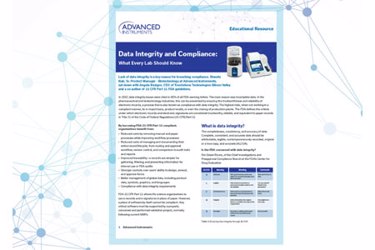Data Integrity And Compliance: What Every Lab Should Know

In 2017, data integrity issues were cited in 65% of all FDA warning letters. The main reason was incomplete data. In the pharmaceutical and biotechnology industries, this can be prevented by ensuring the trustworthiness and reliability of electronic records, a process that is also known as compliance with data integrity. The highest risks, when not working in a compliant manner, lie in import bans, product recalls, or even the closing of production plants.
The FDA defines the criteria under which electronic records and electronic signatures are considered trustworthy, reliable, and equivalent to paper records in Title 21 of the Code of Federal Regulations (21 CFR) Part 11.
Lack of data integrity is a key reason for breaching compliance. FDA 21 CFR Part 11 allows life science organizations to use e-records and e-signatures in place of paper. However, a piece of software by itself cannot be compliant. Any critical software must be supported by a properly conceived and performed validation project, normally following current GMPs.
Shweta Nair, Sr. Product Manager - Biotechnology at Advanced Instruments, sat down with Angela Bazigos, CEO of Touchstone Technologies Silicon Valley and a co-author of 21 CFR Part 11 FDA guidelines to discuss more about data integrity.
Get unlimited access to:
Enter your credentials below to log in. Not yet a member of Bioprocess Online? Subscribe today.
